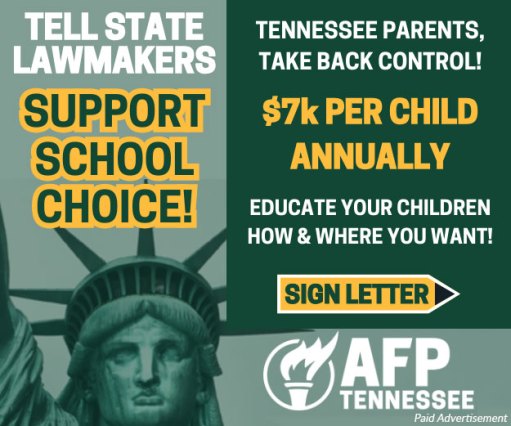Image Credit: Gov. Bill Lee / Facebook
The Tennessee Conservative [By Jason Vaughn] –
In the form of a 7-page amendment to a caption bill, the language for Governor Lee’s “Education Freedom Scholarship Act” has been revealed.
Representative William Lamberth (R-Portland-District 44) filed House Bill 2468 (HB2468) on January 30th of this year as a caption bill with Senator Jack Johnson (R-Franklin-District 27) filing the corresponding Senate Bill 2787 (SB2787) on February 1st.
As a caption bill, the summary for the legislation had very little to do with Governor Lee’s plan other than being under the Education heading.
With a caption bill, amendments that make the bill are filed at some point during the legislative process but are typically not unveiled to the general public in any meaningful way. The caption bill’s summary on the General Assembly website is not updated to reflect the actual bill language from the amendment(s).
Upon the publication of this article, the amendment is still not available on the General Assembly website. However, The Tennessee Journal acquired a copy available for viewing HERE.
The Journal reports that the new “Education Freedom Scholarships” can be used for tuition, textbooks, tutoring services, transportation and computers. Current enrollees of the Education Savings Account program in Davidson, Shelby, and Hamilton counties would not be eligible. The voucher money would not be allowed to be paid directly from the state to the parent.
The amendment states that for the 2024-25 school year, a maximum of 20,000 scholarships will be awarded in the order in which the department received the applications.
10,000 scholarships are available for students whose household income does not exceed 300% of the federal poverty level or the student is an eligible student as defined in Tennessee Code § 49-6-2602 or § 49-10-1402.
An additional 10,000 scholarships are available for students regardless of household income or eligibility as defined by Tennessee Code § 49-6-2602 or § 49-10-1402.
According to the Journal, the amendment closely resembles the version that was inadvertently filed earlier this session before being quickly withdrawn. The bill does not include several points some House Republicans were pushing for including giving high-performing schools a break from what they consider to be “onerous state regulations.”
The Journal goes on to speculate that House changes to the bill could include giving high schools a choice between ACT exams and end-of-course assessments, requiring fewer evaluations for highly-rated teachers and adding maintenance costs to the school funding formula.
The House could also seek a ban on “pop-up” private schools from being eligible for the state tuition subsidy and give schools the option of participating in national or state assessments of students in the voucher program – while making no such requirement for the student body as a whole.
In addition, the amendment states that voucher funds can be used for tuition, fees and materials for approved summer academic programs and specialized after-school academic programs, along with fees for early post-secondary opportunity courses or examinations, entrance examinations required for post-secondary admission, and industry credentials as approved by the department.
Educational therapy services provided by therapists that meet the requirements established by the department would also be covered.
The amendment stipulates that the recipient’s scholarship account must be closed, and all remaining scholarship funds returned to the state treasurer to be used to supplement future school years’ scholarship allocations pursuant to this part, upon the earlier of:
(1) The recipient’s graduation from high school or obtainment of a high
school equivalency credential approved by the state board of education;
(2) The recipient’s enrollment in a kindergarten through grade twelve (K-12) public school;
(3) The recipient’s completion of thirteen (13) school years as a kindergarten through grade twelve (K-12) student;
(4) The recipient’s voluntary withdrawal from the scholarship program; or
(5) The department disqualifying the recipient due to the recipient’s noncompliance with the program requirements.
If passed into law, the act would take effect upon becoming law and applies to the 2024-25 school year and subsequent school years.
While nothing in the language of the amendment itself jumps out as a red flag upon an initial reading, The Tennessee Conservative urges readers to thoroughly review the amendment for themselves – keeping in mind that this initial version is likely to change as it works its way through the legislature.

About the Author: Jason Vaughn, Media Coordinator for The Tennessee Conservative
~ Jason previously worked for a legacy publishing company based in Crossville, TN in a variety of roles through his career. Most recently, he served as Deputy Director for their flagship publication. Prior, he was a freelance journalist writing articles that appeared in the Herald Citizen, the Crossville Chronicle and The Oracle among others. He graduated from Tennessee Technological University with a Bachelor’s in English-Journalism, with minors in Broadcast Journalism and History. Contact Jason at news@TennesseeConservativeNews.com













